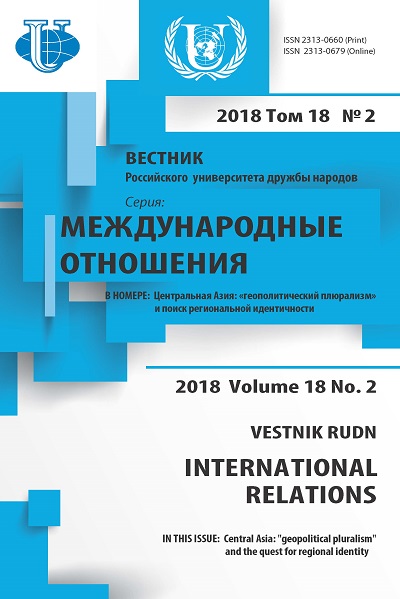CENTRAL ASIAN STUDIES IN THE FRAMEWORK OF INTERNATIONAL RELATIONS THEORIES Interview with R.R. BURNASHEV, Professor of Kazakhstan-German University (Kazakhstan)
- Authors: - -
- Issue: Vol 18, No 2 (2018): Central Asia: “geopolitical pluralism” and the quest for regional identity
- Pages: 400-410
- Section: SCIENTIFIC SCHOOL
- URL: https://journals.rudn.ru/international-relations/article/view/18889
- DOI: https://doi.org/10.22363/2313-0660-2018-18-2-400-410
- ID: 18889
Cite item
Full Text
Abstract
Prof. Rustam Burnashev was born in 1969 in Tashkent. In 1986-1991 studied at the Philosophy and Economics Department of Tashkent State University named after V. Lenin on the specialty “Philosophy”. In 1995-1997 he studied in the graduate school of the Institute of Philosophy and Law named after M. Muminov of the Academy of Sciences of the Republic of Uzbekistan; PhD. Teaching career began in 1991 as a teacher of philosophy and logic of the Department of Philosophy and Law of the Second Tashkent Medical Institute. Since 1998 was Senior Research Fellow, then the head of the Foreign Policy Analysis sector of the Institute of Strategic and Interregional Studies under the President of the Republic of Uzbekistan. Since 2000 - Associate Professor of the Faculty of International Relations, Abylai Khan University of International Relations and World Languages. Since 2002 - Professor of the Faculty of Social Sciences of the Kazakh-German University. From 2004 to 2010 Prof. Burnashev regularly worked at the University of California-Berkeley as an invited researcher. In his interview, Prof. Burnashev analyzes the state of Central Asian studies in Europe and the US, talks about the specifics of the development of Central Asia at the present stage, emphasizing the far-fetched and exaggerated nature of the threat emanating from radical Islamist groups for the Central Asian region.
References
- Бурнашев Р. Анализ вызовов безопасности стран Центральной Азии: центр и периферия // Казахстан в глобальных процессах. 2015. № 3 (45). С. 59-69.
- Фуко М. Археология знания / пер. с фр. М.Б. Раковой, А.Ю. Серебрянниковой; вступ. ст. А.С. Колесникова. СПб.: ИЦ «Гуманитарная Академия»; Университетская книга, 2004.
- Фуко М. Ницше, генеалогия и история // Философия эпохи постмодерна: Сборник переводов и рефератов. Мн.: Изд. ООО «Красико-принт», 1996. С. 74-97.
- Фуко М. Слова и вещи. Археология гуманитарных наук / пер. с фр. В.П. Визгина и Н.С. Автономовой. СПб.: А-cad, 1994.
- Burnashev R. The Dynamics of NATO Presence in Central Asia: A Genealogical Analysis // Central Asia’s Affairs. 2017. No 2. P. 33-42.
- Buzan B., Wæver O., De Wilde J. Security: A New Framework For Analysis. L.: Lynne Rienner Publishers, 1998.
- Cornell S.E., Starr F., Tucker J. Religion and the Secular State in Kazakhstan. The Central AsiaCaucasus Institute and the Silk Road Studies Program, 2017.
- Costa Buranelli F. Spheres of Influence as Negotiated Hegemony - The Case of Central Asia // Geopolitics. 2017. doi: 10.1080/14650045.2017.1413355.
- Costa Buranelli F. World society as a shared ethnos and the limits of world society in Central Asia // International Politics. 2018. Vol. 55. No 1. P. 57-72. doi: 10.1057/s41311-017-0064-6
- Fish S.M., Choudhry O. Democratization and Economic Liberalization in the Postcommunist World // Comparative Political Studies. 2007. Vol. 40. No 3. P. 254-282. 10.1177/0010414006294169
- Nourzhanov K. State-Society Dynamics and Authoritarian Stability in Central Asia // Weak States, Strong Societies: Power and Authority in the New World Order / ed. by A. Saikal. London and New York: I. B. Tauris & Co Ltd, 2016. P. 123-148
- Weak States, Strong Societies: Power and Authority in the New World Order / ed. by A. Saikal London and New York I.B. Tauris & Co Ltd, 2016
- Wilkinson C. The Copenhagen school on tour in Kyrgyzstan: is securitization theory useable outside Europe? // Security Dialogue. 2007. Vol. 38. No 1. P. 5-25. doi: 10.1177/0967010607075964
Supplementary files










